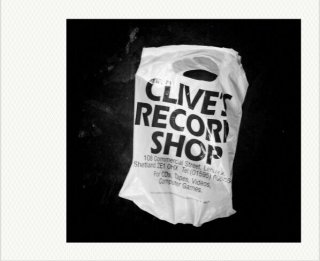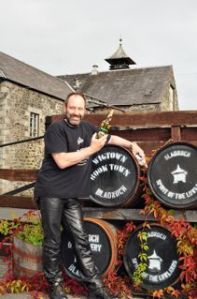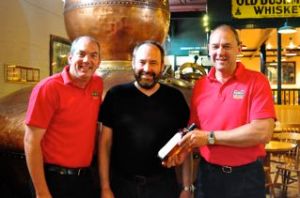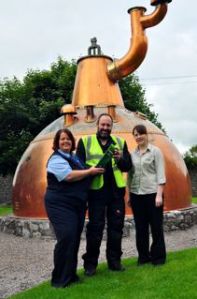Posts Tagged ‘Scotland’
The last record shop
Clive Munro’s record shop has always been the last in Britain, or at least the northernmost. It has been my favourite, too, for the quarter of a century I’ve known and used it.
That was mainly due to Clive himself, the same age as me, with similar tastes in music. His recommendations could be trusted. His tendency to stock obscure Nick Lowe box sets, not to mention every jot and tittle of the Costello oeuvre, was wholly admirable. He is one of only two people I know who can talk knowledgeably about the work of Californian singer-songwriter Peter Case.
I helped Clive with his stall at a couple of early Shetland Folk Festivals, watched vinyl vanish from his shelves (the second-hand tapes he once dealt in at two previous, tiny locations, had already disappeared) and was happy to spend cash when he moved to large Commercial Street premises, where computer games and DVDs featured heavily. A branch in Orkney opened and closed quickly. But Clive’s in Lerwick would go on forever, surely? On our remote archipelago, we needed, deserved a great record shop. How would we get the good stuff otherwise?
Then came Amazon. Then came iTunes. Play.com. A big new Lerwick branch of Tesco. And now Spotify. For me, deluged with free CDs due to the radio show, and with a Spotify Premium account as well, my CD purchasing fell away to almost zero. Clive announced that the shop would operate using half its floorspace, concentrating on specialised material, local folk, country and with a range of new vinyl too.
But it didn’t work. History is against shops like Clive’s, and especially in Shetland, the internet has revolutionised shopping. Now we can have DVDs and CDs winging their way from one island (tax-free Jersey, where Play.com is based) to the Greater Zetlandics in a flash, and at prices less than Clive was paying wholesale. Or we can stream and download, listen and forget in less time than it takes to say: “How much diesel will I use getting into town and back?”
So it’s nearly over. The shop doors will soon shut forever. There’s a closing down sale, but I’ve been avoiding the place, because I didn’t want to look like some kind of scavenger, having spent so little there in recent months. Today, though I went in, bought a DVD, and found Clive in positive mood, looking forward to a new start doing – well, he knows not what, as yet.
He has been a musical mentor and guide, a shaman for hundreds, maybe thousands of Shetland’s music fans. He has stocked indie releases by local bands, put up posters, sold tickets and been a crucial force for all that’s good in the world of twangy guitars and great lyrics.
The last record shop in Britain will be sorely missed. But not enough, and by not enough people, for it to remain open.
Drinking for Scotland, legal drug dealers and our country’s shame
I gave up drinking for 31 days, once. Made a radio programme out of it. And then I went back to my Friday night red wine, my couple of whiskies a week, my beer and skittles. Without the skittles..
The occasional binge, too, in the sense of combining beer, wine and whisky in doses calculated to leave me slumped in an armchair, dribbling and snoring while Jools Holland once again elbows his mediocre piano into some hapless, desperate performer’s arrangement. Later. And later, and later, and later…
But in Caledonian terms, my binges do disservice to the word. I am, to put it mildly, a lightweight these days when it comes to booze. I hate, always hated being drunk, and now, when I find myself in social gatherings where alcohol is being taken, I usually safeguard my exit route before even beginning to imbibe. I ensure there’s a way home, or out, and when the boredom begins to seep through, when dehydration starts to sandpaper the thrapple, I make my excuses and leave. Or switch to Ribena.
I hang out with connoisseurs, sometimes. People who drink professionally, or who, to be more precise, describe whiskies for a living. Indeed, I have done this myself, though I always have to fight back the giggles, as there’s something essentially ridiculous about the striving to differentiate single malts, one from Glen t’other. Yes, they are different, but in the way grades of heroin and cocaine are different. The taste is not the point of whisky. It’s meant to do a job on you, enliven, inebriate, dull, destroy. Like Keith Richards’ obsessive hailing of Merck pharmaceutical ‘fluffy’ cocaine in his recent autobiography. Push comes to sniff, dirty lumps of Bolivian or Columbian crack or factory-made Swiss snow are drugs that deliver the same message to heart, brain and body. Whisky is a delivery vehicle for alcohol.
They are, for the most part, lovely folk, the dope dealers of the whisky trade. They are more than respectable, occasionally hilarious, often charming. It’s an area of Scottish life absolutely awash with money, and the marketing of uisge beatha has always been cutting edge, from the days of Tommy Dewar onwards. Doubtless he would have been happy to be called a brand ambassador. Maybe not an evangelist.
Whisky is now so suffused with lore, mythology tall tales, anal-retentive male compulsions and downright bullshit that you’d think it was some kind of art. It’s not. It’s a drug, disguised for its many niche and mass markets in the form of a social badge, a collector’s trophy, a mind-blowing display of wealth (silver, gold, platinum and diamonds encrusting a bottle? You got it) a signifier of coolness, of belonging.
Expertise has become the latest marketing tool. Whisky clubs and societies have sprung up worldwide, whisky festivals (I admit it. I participate. I talk phenols and oakiness, caramel and esters, washbacks and mash tuns. I judge whisky competitions, for goodness’ sake) see wise heads, young and old, slurping and nodding over rarities in hotel function suites. Notes are taken, words are slurred, stairs fallen down. A great deal of fun is had. Money changes hands. Lots and lots of money. Mantras? Excess is good. Greed is good. throw the cork away. Moderation is for sissies.
Elsewhere, the same companies slosh alcopops and factory-made sweet spirits into underage bellies. industrial scale drinking is encouraged at the annual alcofest-with-music that is Pee in the Dark, or T in the Park. Scotland goes out on a Friday and gets rat-arsed, crashes cars, kills pedestrians, freezes to death in a park. Slashes, burns, abuses, fights, smashes, damages. Does the same again on Saturday. Maybe a a few Smirnoff Ices on a Sunday to ease the way back into work on a Monday. Or just miss Monday out, why not? Internationally, countries in Africa, Asia and the Americas are targeted. Drink this, it’ll make you…richer, more attractive, it’ll make you belong. One glass makes you bigger, one glass make you small…
Hey, let’s not forget the weans. Foetal alcohol syndrome, anyone? Och, how can you have sex anyway if you aren’t pished? Brain damage. Shrinkage. Fits. The meaningless rubbish that’s sold only to mess you up, like Carlsberg Special, originally brewed specifically for Winston Churchill’s visit to Denmark after the war, now the tipple of choice for oblivion merchants everywhere.
Tomorrow, the Scottish Parliament will vote on party political lines and eradicate the proposed bill that would set a minimum price for alcohol in Scotland. Spurious arguments will be advanced that raising the price of a unit of rotgut cider will cause terrible damage to the economy, and won’t stop folk boozing unwisely anyway. Education is all. have a wee dram. Smell the history, the geography, the culture.
I don’t believe that for a moment. I am afraid that the drug dealers have once again flexed their considerable muscle and quashed the first serious attempt to tackle the shame that is Scotland’s relationship with alcohol. Gutless, ignorant, hidebound politicians have cowered before them.
So. That’s that, then. Might as well go out and get pished, eh? Just remember this salient fact: Two single malts: that’s enough to destroy your ability to appreciate their quality. After that, you might as well switch to Old Gumripper or Glen Haemorrhage. Slainte!
Squalor, celebration and branding: Tennents, Live Nation, mud and manure
Our friend who had worked in refugee camps across the world was quite definite: “The camps tend to be organised, and for survival, they’re kept clean. They’re nothing like as bad as this.”
‘This’ being the T in the Park campsite on the Friday afternoon: tents pitched on top of one another, some 40,000 people living it larger than large. And dirtier than dirty. Despite the much-vaunted ‘Citizen T’ attempt to make folk more litter-aware, waste from toilet paper to plastic bags to lager tins was simply dumped on what had once been grass. Oh, and the overwhelming aroma of human ordure hung in the damp air, mingling with the eternal niff of Balado: rotting poultry waste from the industrial hen houses around the site.
The dirt and waste at T in the Park, the smell, the drugs, the incredible binge drinking: no-one talks about it, except in jocular terms (“see the joyful campers cavorting in the mud! It IS just mud…isn’t it?”). Media coverage, generally, is utterly in thrall to Tennents and the event organisers, partly because all hacks need accreditation, partly because the whole thing is so big every dying media organisation wants or needs to hang onto its demographic coat tails. T covers the mudfront. Tennents (whose lager is generally regarded as a bit of a joke the rest of the year) get coverage other brands can only dream about, including network TV with their name on every broadcast. On the BBC, no less. And the tragic elements – this year, one death, two stabbings, a sexual assault – drift away on the sweet wind of happy memories, and thoughts of next year.
And yet so many love it so much. For some, it’s their only holiday, an annual transformative experience. A baptism by mud, noise and alcohol, a relaxation of all the rules by which you can be reborn into some kind of coping with the dreadful tedium of normal life.
I was only there this year for the Friday and a few brief moments on Saturday, before being whisked to hospital with excruciating stomach pain (I’ll blog about my splendid experiences at Glasgow’s Western Infirmary in a few days). But this was my fifth T, and wet or dry, dirty or muddy, my feelings are still the same. It’s no place for the likes of me.
This was -maybe – the last time I’ll have to to attend in a parental capacity – after this year, all the offspring are old enough to take it on themselves – and it’s a relief. Although there’s much great music to enjoy, T is not about individual appreciation of artistic endeavour. It’s about being there, being part of the herd, about The Event. On one level, it’s about money, and branding; on another, it’s about being branded: You went to T in the Park. You got drunk. You took weird drugs. You had sex in a tent. You met people from outlandish places like Wick and Greenock. You didn’t sleep. You saw famous acts off YouTube like JayZ, Eminem, Muse, Kasabian. Or at least, you heard them in the distance. You survived. You were there. It was fantastic.
It’s for the young, basically. Though the elderly were there, too, grimly protecting offspring, goggling at the vast amounts of male public pissing, trying desperately to find a seat. Or pretending that they too were still usefully youthful.
It’s for the young if you’re doing the downmarket camping thing, which is the full-on T-wading-through-shite experience. The elderly and the children should travel back and forth on day tickets, sleeping in proper beds. Remember it’s only an hour from Glasgow. Or try The Residence – brutally expensive luxury camping, for people who actually want to sleep at night; that’s what we did this year. Good pizza, proper showers, clean toilets, nice Cava, pleasant yurt. Same mud. Privileged access to the VIP hospitality area, a secret access track.We paid the premium and it was worth it.
Our kids absolutely loved the whole damn thing. Their mum, fortunately, was able to oversee both her husband’s hospitalization and the weans’ festivities. T is the centre of their year, and I know Martha (16) will wear her wristband until it rots, or next year’s festival comes along. The wet, the toilets, the mud, the sense , somehow, of a conspiracy by the organisers to create an illusion of ‘the festival’, as defined by 1970s Glastonbury – love, peace happiness, good vibes – when this is a multinational money-making concern (£13 million a year), owned by the extraordinary Live Nation behemoth which emanated originally from Clear Channel and, worryingly, possesses almost the entire world of entertainment, from Nickelback to U2 to King Tut’s Wah Wah Hut, and even part of glorious Glasto – none of that mattters.
For the bairns, T in the Park is a glorious festival of belonging, of great music, of growing self reliance and survival. For me, the squalor, the filth, my aching feet and the awful smell of chicken farming can’t be overcome.
Face it, I’m too old for this. Next year, I’ll watch it on telly with some cold beer. It won’t be Tennents.
And for an, ahem, more robust view of the whole thing, why not try Limmy?
Why I’ve given up buying printed newspapers.
My problem with newspapers, living where I do, has always been actually getting hold of the things. When I first arrived in Shetland, more than 30 years ago, it would be 2.30pm or so before the blatts made their way to a very limited number of shops. Before the demise of Highland Airways a few months ago, you could sometimes get the dailies at 10.30am, but that was totally dependent on weather. Fog, ridiculous winds, snow, ash, plagues of frogs – all could leave you paperless. Now, with a new contract in place, things have settled down to an irregular 11.00, but with no Guardian in Lerwick – copies aren’t being delivered to the aeroplane in time. It comes from England, you know.
Now, I travel – by bus, car or motorcycle – to Lerwick every weekday, but most of the preparation for the show, most of the day’s computer time, is from 7.00am at home. In our primitive rural redoubt, we have wi-fi. I can access Guardian Online, the Telegraph, the much improved Herald, the sadly diminished Scotsman, and the fast and furious Daily Record, plus the amazingly competitive Shetland Times and Shetland News presences. Reform Scotland’s fantastic compilation pops into my in-box, as does the Scottish Review’s sarky musings. Caledonian Mercury, though basically an aggregation of (too short) blogs, is always worth a look. Facebook, Twitter and Google News, plus the excellent NewsNow, and of course the glorious BBC, and I’m sorted. Quirky tales for the show? If I’m still short, Ananova Quirky, Yahoo Oddly Enough. There are blogs, of course, galore to choose from, but frequently accessed from Twitterbook. And there’s 38 Minutes for abstruse and often unintentionally hilarious insight into the IT Crowd of Scotland.
This is done on a selection of (mostly old) laptops (Macs and PCs, distributed throughout the house. I don’t have an iPad, and probably – never say never – won’t be buying one. I’m leaning towards Google Android for phones and will wait for the killer Android tablet which is bound to arrive soon, from a reputable manufacturer, and with the stuff that Apple have failed to provide with their giant iPod Touch: USB sockets, Flash etc. This is not about hardware.
It’s simply about access. Admittedly, I’m an extreme case – an inveterate media user who lives at the very edge of traditional distribution networks – but I highlight the simply fact that content is everything, and that old-fashioned methods of distributing and consuming that content are essentially redundant. Yes, there’s a pleasure to be had in buying a paper and sitting at the Peerie Shop Cafe in Lerwick consuming print and scones. But that’s an indulgence. And an inconvenient one, too, given the sheer stupid unwieldiness of broadsheet newsprint. If anything displays the stupidity of newspaper management, it’s the insistence on maintaining a tradition of almost unusable size of page being linked to ‘quality’. How can we expect them to deal with digitisation if they can’t even understand the limits of human hand-to-eye co-ordination (especially in a windy place like Shetland)?
Oh, but we can’t make online pay, comes the whine. Yes you can. Scrap the printing presses, the delivery vans, the chopping down of forests, the whole Victorian infrastructure of newspaper production, and your costs will plummet. And will I pay for a subscription? For some things, yes. Would I pay some kind of central licensing fee for accessing all of the above outlets? Here at the Edge of the World, Ultima Thule, with the sea lapping at my door? So I don’t have to hassle my way into town to find the plane hasn’t got in? Yes.
Particularly if you give me a free Android tablet to subscribe on…or subsidised, like with Sky boxes and dishes. Come on Rupert, you know it make sense. I’ll even accept that The Times will be hard-wired as home page, until my son hacks it out of there.
At a pinch, I’ll even take a Murdoch iPad…
THE BOOKSHOP AT THE EDGE OF THE WORLD
THE BOOKSHOP AT THE EDGE OF THE WORLD
How to Impersonate Famous People
Christopher Fowler. Prince Paperbacks, 1984. first US edition. 85pp Very good/very good. Some rubbing at corners
Books.
That’s what the notice says. Books.
It doesn’t read ‘Bookshop’. That would contravene planning law, as The Bookshop At The Edge of the World is actually an old, crumbling crofthouse called Da Kirk o’ da Shun, full of forehead-crunching doors, unexpected steps and rickety shelves that sway in the wind. Well, it’s the wooden panelling on the walls that occasionally flutters in a big gust, sending the shelves into a mild rocking motion which can make you think you’re at sea.
And in sense, you are. This is the remote north of Shetland’s biggest island, which is called Mainland, because it’s the main bit of land. As opposed to ‘the mainland’, which is Scotland, some 200 miles south. Locally referred to as ‘sooth’. The winds – big, frequently hurricane force – come howling in from the Atlantic or the North Sea, of which Shetland (never ‘The Shetlands’) is the crossroads, the receptacle for all sorts of driftwood, detritus, flotsam and jetsam. Things get washed up here. All sorts of things.
Me, for instance.
That notice. Books. Or, I supposed, ‘Books.’ Note the capital ‘B’. It could mean a number of things. It could be a simple proclamation that books exist. A gentle reminder to the passing motorist, cyclist, pedestrian or low-flying helicopter pilot of a form of communication which involves paper, text, and card. Not some flourish of pixels on a screen. Objects, tactile and physical, organic, soft, prone to damage and rot. Cheap or ferociously expensive. but never worthless. Human outpourings of anguish and joy, learned irrelevance and breathtaking genius.
And objects of trade. Books to buy, books to sell, books to trade.
The truth is, the notice means simply that there are books lurking in the squat little crofthouse at the top of the track, that somebody (me) is to be found in said crofthouse, and, for the duration of the notice’s presence, is willing to receive visitors, potential customers, and exchange some of those books for money. I only put the placard (painted by my wife) out when I’m feeling relatively sociable, and few people actually respond to it. Apart from one or two friends and neighbours who take it as an indication that I’m in and willing to provide coffee, tea and the plain chocolate digestive biscuits I like. And the infernal mice absolutely love.
Some of my local acquaintances will browse the shelves, occasionally borrowing a book that’s taken their fancy, or asking if they can listen to one of the several hundred vinyl LPs and singles that I also…own. ‘Stock’ seems the wrong word. Because selling books and records isn’t really the point,. Being here is the point. Among books. The smell of books. And peat smoke, from the cast iron stove, which if course doesn’t really provide the kind of humidity-controlled environment in which -some rather valuable – volumes should be kept. But then, as I sayd, this is a bookshop designed, first and foremost, for my comfort and pleasure.
The coffee.. I offer free coffee to everyone who comes in, all my, well, customers. Or potential customers. Sometimes oyu have to take long view, cultivating someone for weeks or even months before they decide to buy that vintage copy of Biggles Goes West for, oh, 50 pence. the coffee is not to everyone’s taste. It’s made from fair trade Ethopian beans, roasted and packed in Lerwick, Shetland’s capital. Which is not generally known as a centre of coffee roasting expertise. That’s all my fault, actually, but I’ll tell you about that later.
Oh, and there’s music, of course. The giant, 1960s loudspeakers, the ancient Quad valve amplifier, painted eggshell hospital blue, that glows orange and smells of burning pylons. The manual Linn Sondek record deck, made in Glasgow 30 years ago by redundant shipyard workers. I also have a selection of guitars and other vintage sound equipment, most of it for sale. Probably. At the right price. To people who seem deserving of ownership. I mean, you have to be discriminating in this business. Did I say ‘business?’ My wife, Susan, says it’s a shed.
“It’s the ultimate shed, Tom,” she anounced during her first visit. She had been before, but I didn’t actually formalised the retail nature, so to speak, of the building until about a year ago. “It’s a male thing. You’ve got your books, your records, your guitars. You’re happy as a pig in shit.”
“Why do women not have sheds?” I wasn’t issuing any denials. She was right. This is a kind of shed, only with a public aspect. And I can claim the electricity against tax.
“Women don’t have sheds because they have houses” replied Susan, crisply. “Homes. There’s no need to escpae to secret little worlds where they can..tinker. Play games. Actually” – and she glanced around, at the comfortable old couch, the ample floorspace – “I’m surprised you don’t have a train set in here. Or a Scalextric. There’s room.”
I folded my arms and thought for a minute.
“You’re quite right,” I said. “But what I really fancy is an O-gauge system for the garden, you know, like Neil Young has. Neil Young the Canadian singer songwriter, not Neil o’da Flitterwicks.” (Neil o’da (of the) Fliterwicks (his house), also surnamed Young is a well-known local crofter and aggressive drunk with a tendency towards public defaecation. There is general local concern that this habit could be the end of him on a really cold winter’s night).
New bus blarney over at Beeb blog
I’ve written a wee piece over at the BBC Radio Scotland blog about my daily commute by bus. Including the (true) tale of the man last week who sat in front of me with a (live) fish…















